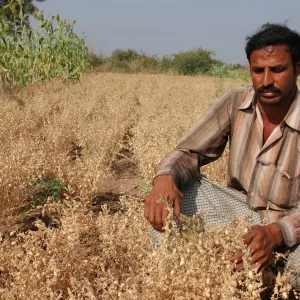Global South Unites to Strengthen Agricultural Resilience and Share Solutions for the World’s Most Pressing Challenges
Over 56 nations gather at virtual ISSCA-RIS conference to elevate homegrown innovations for climate-resilient agriculture. In a landmark show of unity, more than 56 countries from across the Global South convened virtually for a high-level conference on Strengthening Agricultural Resilience—an event aimed at sharing agricultural solutions among nations of the Global South to collectively address their most urgent and complex

Global South Unites to Strengthen Agricultural Resilience and Share Solutions for the World’s Most Pressing Challenges
Over 56 nations gather at virtual ISSCA-RIS conference to elevate homegrown innovations for climate-resilient agriculture.
In a landmark show of unity, more than 56 countries from across the Global South convened virtually for a high-level conference on Strengthening Agricultural Resilience—an event aimed at sharing agricultural solutions among nations of the Global South to collectively address their most urgent and complex challenges, from climate stress and soil degradation to market volatility and food insecurity.
Jointly hosted by the ICRISAT Centre of Excellence for South-South Cooperation in Agriculture (ISSCA) and DAKSHIN – the Global South Centre of Excellence at the Research and Information System for Developing Countries (RIS), the conference forms part of the Government of India’s Development and Knowledge Sharing Initiative to advance South-South collaboration.
The forum brought together global leaders in agricultural research and policy – including Professor Sachin Chaturvedi, Director General of RIS, and Dr. Himanshu Pathak, Director General of ICRISAT – alongside scientists, farmer organizations, and development institutions who showcased powerful, field-tested solutions developed in the South, for the South.
Speaking at the forum, Dr. Pathak said that the Global South is rich in indigenous knowledge, homegrown technologies, and tested development models.
“Countries facing similar climates and economic realities are uniquely positioned to share practical, resilient solutions with one another.
“What we need now is the confidence and systems to scale this cooperation so that local successes become global progress.
The Green Revolution offers a telling lesson: its greatest impact wasn’t in the science alone, but in how nations like India, Mexico, and the Philippines adapted and transformed those ideas into solutions that worked for their own people and landscapes” said Dr Pathak.
Three key pillars framed the agenda:
- Showcasing the ISSCA Knowledge Portal launched in Delhi on 3 June 2025, now featuring 85+ curated, science-based and scalable innovations across all domains of agriculture—and growing daily.
- Partner-led presentations across five thematic areas:
- Natural Resource Management & Climate Resilience
- Crop Improvement & Production Technologies
- Livestock Improvement & Production Technologies
- Digital Agriculture
- Agribusiness & Market Systems
- Strategic dialogue on regional technology needs, policy alignment, and co-development opportunities to scale what already works for diverse contexts across the Global South.
The ISSCA platform positioned as a flagship global south agri resource hub uses filtering to help match solutions to specific geographies, crops, climate challenges among other areas.
Participants reaffirmed that the future of agriculture is not one-size-fits-all, and that solutions must be tailored, co-owned, and co-developed.
Highlights and Outcomes:
- Endorsement of ISSCA as a neutral platform to amplify Southern-led innovation
- Commitments to pilot South-South collaborations across multiple agroecological zones
- Interest from additional countries to join ISSCA’s regional hubs in Africa and Latin America
As the conference concluded, the central message was clear: resilience is not built in isolation, and solutions need not always be imported. Both emerge through shared knowledge, bold partnerships, and trust in the innovations the Global South already holds.
ISSCA will now carry these outcomes into upcoming policy forums and continue enhancing its knowledge portal in response to stakeholder demand, advancing its broader mission to connect innovation with impact across the Global South. Visit the ISSCA Knowledge Portal

